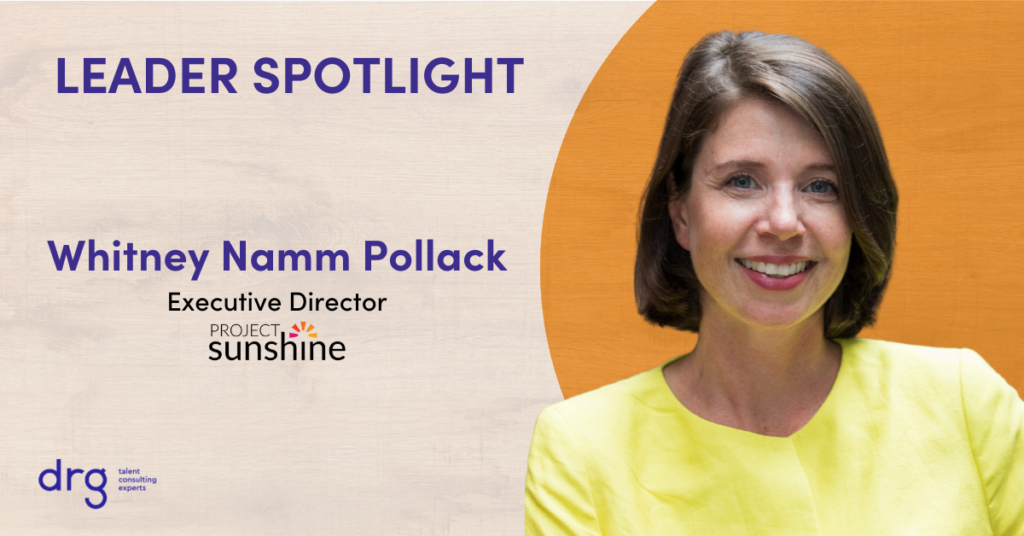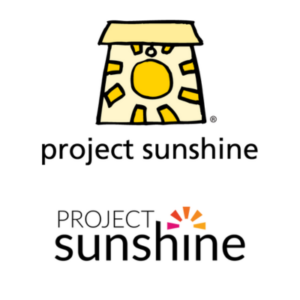
Project Sunshine delivers the healing power of play to children with medical needs through trained and dedicated volunteers. In 2018, DRG worked with Project Sunshine to identify Whitney Namm Pollack as the organization’s next Executive Director.
In this interview, Pollack discusses what she’s learned nearing her five-year mark in the role and how she and her team are positioning Project Sunshine for future growth.
What did you first do when you joined as Executive Director of Project Sunshine?
Get to know everybody — the board, the staff, how the workflow functions. I really wanted to understand how we were delivering our mission and the people who were doing that. I wanted to get their input on how they thought things were going and what they wanted to see: strengths, weaknesses, points of efficiency — that’s what I focused on in the beginning.
What has Project Sunshine accomplished that you are most proud of?
We bring play and activities to children facing medical challenges in hospitals. So, when COVID lockdown happened, we could not deliver our mission in the same way. None of our volunteers could go into hospitals, it just wasn’t safe for volunteers or patients, and hospitals were severely limiting visitors. Additionally, we sustained ourselves through events – whether that was events through individual donors or corporate events with volunteer engagement – so we had to reimagine how to deliver our mission and become financially stable.
We had to innovate, and we came out of the pandemic much stronger with our new telehealth program. It’s the same mission, still connecting with and bringing play to children through volunteers, but we’ve added a program called TelePlay which play and activities over live video conference., which we didn’t rely on before 2020. I’m proud we not only survived but are now thriving. We took a very difficult situation for both our organization and the children and families we serve and we innovated.
Tell us about a new initiative/strategy/project at Project Sunshine and what you envision it will do for the community you serve.
TelePlay is our newest strategies and it’s really integrated with our other programs. We are investing in a digital transformation that will impact all of our programming and all of our constituents. We are launching our first campaign and part of the investment will be in this digital platform that we’re building which will impact and streamline all of our programs.
On top of that, we’re returning our in-person activities, Here to Play, to hospitals. We’re recruiting and rebuilding our volunteer base to be back in action. We’ve really been investing in our training and our recruitment and now our volunteers are participating six times more frequently than they did previously.
How has Project Sunshine evolved since the beginning of your tenure?

We’ve really invested in our staff and board culture, and we’ve had to think about our branding and our mission. We have a new mission statement, a new visual identity, new taglines – we had not updated our visual identity in the lifetime of the organization, since it was created in the 90s. For our staff and board culture, we’ve had a lot of changes with how we are structured and how we work, and we now have a really vibrant and dynamic staff and board.
What are some of the core principles and values that guide your work and define your approach to leadership?
I believe in direct communication, and I always try to seek to understand before I seek to be understood. I believe in communicating with empathy with all of our constituents and I think that’s really important when you’re talking with colleagues on staff and with your board members. I try to bring integrity and empathy to all of my conversations.
How has this role helped you develop as a leader?
You can’t do it alone. That is something I really understand now – you must rely on the talents and expertise of your staff and your board. And that collaboration makes the work more fun. It’s my role to bring the best out in everybody and to get the best outcomes for the organization so we can achieve our mission, but I’ve learned how essential it is to rely on others.
It’s so important to give autonomy to staff members and to create partnerships with the board. They have counsel and expertise that are so helpful for our staff in making the best decisions that we can, and we’ve had to make a lot of big decisions since the pandemic. One person, one CEO does not have all of the expertise, but if you’re smart, you can find good partners and ask them questions, trust them, and make the best decision you can.
What do you most hope to achieve for Project Sunshine?
We want to achieve the goals of our campaign: to double the number of children and families that we serve. We want to invest in technology to help us scale. We have gotten everything in order internally. We have the right people, the right staff, the right board, the processes in place, and we want to scale up. We’re excited to bring the healing power of play to more children.
Anything else you’d like to add?
We are the only organization operating on a national level with this mission of bringing play to children with medical needs through trained and dedicated volunteers. Our TelePlay program is the only program of its kind in the country. We are planning and hoping to grow our hospital and medical facility partnerships, including new collaborations with health-based organizations, research organizations, and diagnosis communities.
All of our services are free to our medical partners and volunteers because we are supported by philanthropy. We are always excited to talk to organizations serving children with medical needs about potential collaborations.
